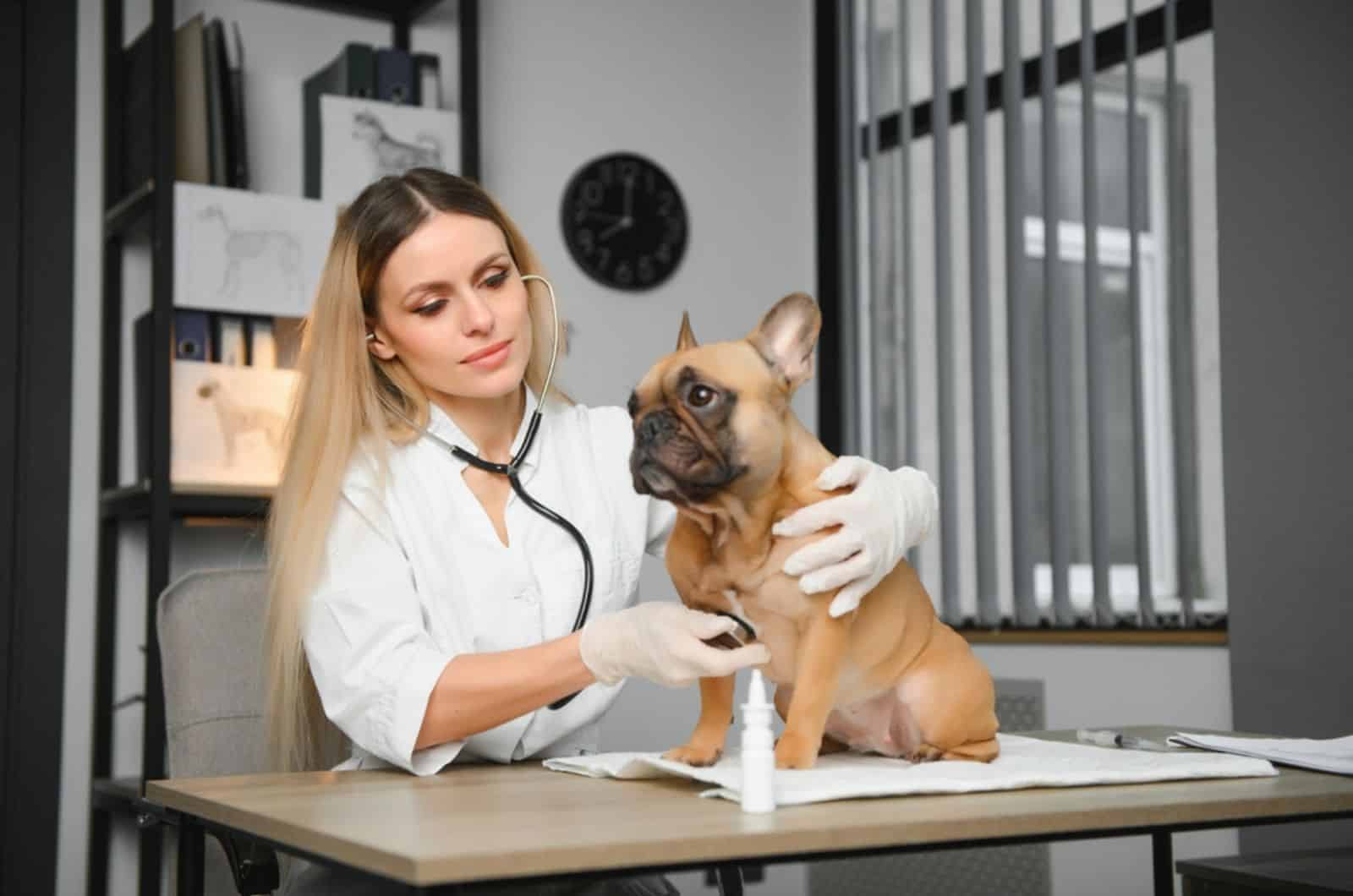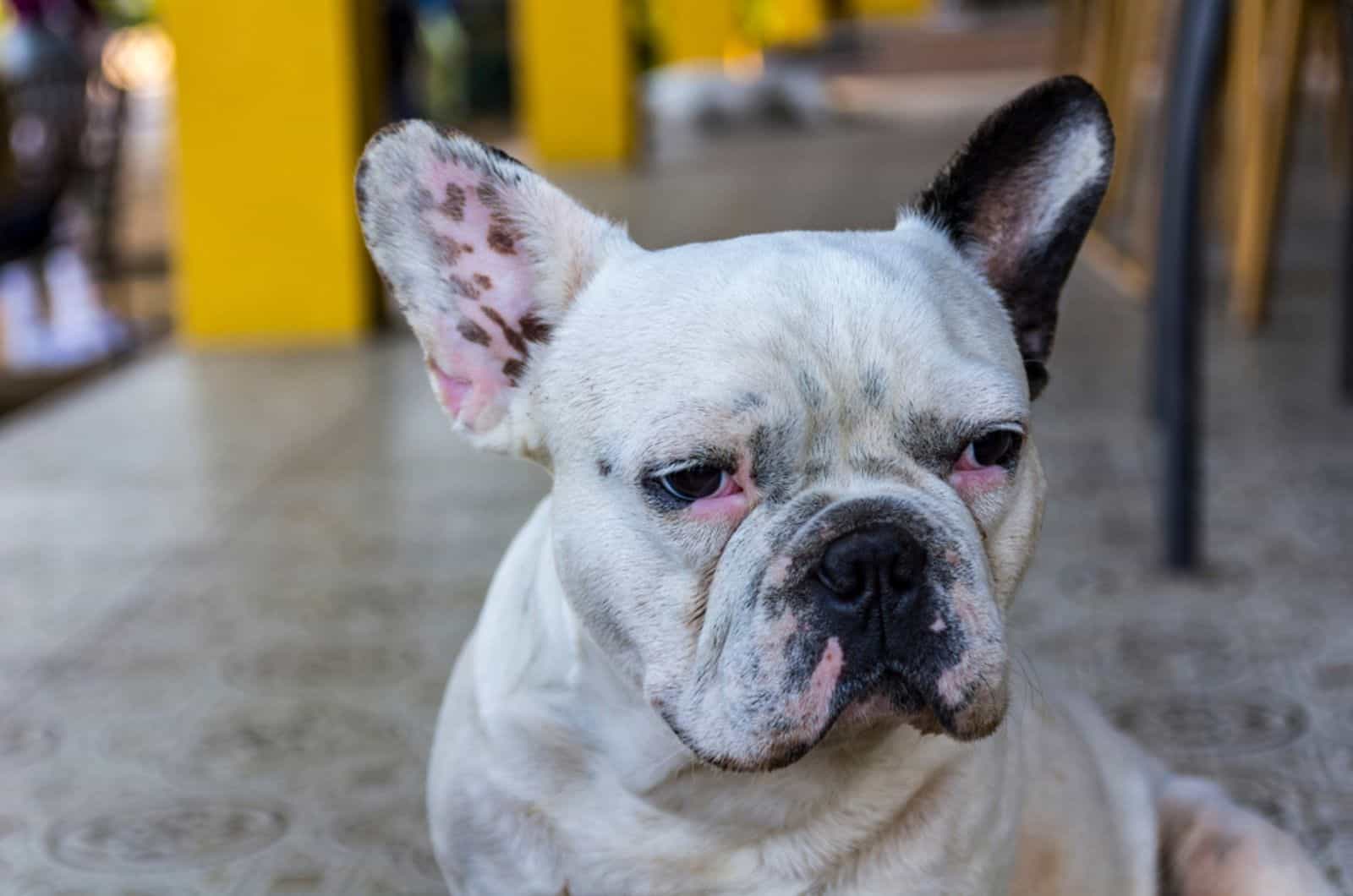Our beloved little French Bulldogs can often get sick, but what do you do when they keep being sick? I know that it is so hard to watch your dog suffer from some health problems, but trust me… there is always a way out of these terrible situations.
Being one of the most famous dog breeds in the world, especially of the 21st century, Frenchies are bred all over the world. You can probably guess what sorts of things can come with a dog breed that can potentially be bred without any strict rules that every breeder should follow.
Whatever the reason is behind unethical breeding, it is something that you should definitely pay attention to when you are buying your French Bulldog puppy.
Whenever a certain breed became a trend, breeders would, of course, breed that dog more than they should, and often in unreasonable circumstances, resulting in pups that were more likely to get sick, and keep being sick.
Therefore, finding a reputable breeder, no matter what breed you choose to have, is one of the best ways of being spared from these Frenchie health issues.
However, if it is the case that you are facing some health issues, and you don’t know where to start, and what the reasons are as to why your French Bulldog keeps being sick, you are at the right address.
Why Does My French Bulldog Keep Being Sick

Frenchies are quickly rising to the top of the small dog breed popularity list due to their joyful and loving personalities. You understand why if you’ve ever had a French bulldog! Their weird behaviors are what make them so charming.
They are lovable, adorable, tiny dogs with lots of amusing characteristics – tolerant to most surroundings, and friendly with both kids and other animals. Additionally, they require fewer walks than larger dogs do!
However, there are numerous health issues with the breed of Frenchies. The majority of French Bulldogs will experience a few of the most prevalent health issues that are characteristic for this dog breed.
These health issues frequently appear in Frenchies as young as two to three years old, and they may result in unanticipated veterinary costs. Additionally, they have a big impact on the pet’s quality of life.
1. Your Frenchie Was Bought From An Unethical Breeder
While searching for a French Bulldog breeder, it might be challenging to tell the difference between responsible and ethical breeders and reckless and greedy breeders who are only in it for the money.
Due to the increase in unreliable breeders and uninformed consumers brought on by the French Bulldog’s recent popularity, many Frenchies now find themselves in rescue organizations or shelters.
Before deciding to adopt a dog, please make sure you have all of the medical and behavioral details from the rescue organization if you are adopting, as well as if you are buying your dog from a breeder.
The dog is not at fault for being in that situation; there certainly is a reason behind it. The breeder may be offering puppies with numerous genetic defects that have led to a variety of health issues that the prior owner was unable to handle on a financial or mental level.
Alternatively, the previous owner may not have been ready to care for a dog for a variety of reasons, which led to behavioral issues. Make sure you’re equipped to handle this dog. It doesn’t actually need to move from house to house.
If you get in touch with the breeder, but they are reluctant to let you know where the pups were delivered and the circumstances in which they are presently living, this may indicate that they are an unethical breeder, or have a puppy mill, or that they are a backyard breeder.
Examine every area where the puppies and their guardians live. Clean, odor-free kennels and training areas ought to be present on the property.
Dogs shouldn’t be kept in cages for extended periods of time. If possible, they should operate separately. It is necessary to heat and cool the kennel, and have a constant supply of fresh water.
2. Your French Bulldog Has A Weak Immune System

Dogs with a compromised immune system are more susceptible to a variety of conditions, including infection, obesity, rheumatism, and tumors.
According to veterinary professionals, keeping your dog’s immunity in harmony can help lower these risks and improve his or her general well-being.
You can think about adding some extra nutrients to your dog’s diet to help strengthen the immune system. However, we caution against acquiring a pill for every conceivable ailment.
Giving your dog a variety of products makes it simple to give them too much of some nutrients, and compounds might hinder absorption.
Probiotics are substances that we advise taking because they bring healthy microbes into the gastrointestinal tract. Improved gut immunity is promoted by healthy gut flora, and this has been demonstrated to boost internal immunity.
If you’re thinking about adding probiotics to your dog’s food, take into account that their microbiome is different from ours. Therefore, it’s unlikely that giving them the very same supplement that you take or giving them a bowl of yogurt will be of any use to them.
Consulting your veterinarian regarding all of the crucial information regarding boosting your Frenchie’s immune system is a preferable alternative.
3. Viral Infections And/Or Bacterial Infections
Another common skin condition that Frenchies experience is bacterial skin infections, often called “pyodermas,” which also results from their desired skin folds.
Whenever a cut or scrape develops an infection, pyodermas happen. Fortunately, your veterinarian can easily treat pyodermas with oral or topically-applied antibiotics.
Frenchies frequently have narrower ear canals because of their highly attractive flat face. Due to their tiny canals, Frenchies are unable to properly clean their ears, which causes the canals to stay warm and damp.
This creates a setting that encourages the growth of bacteria and yeast, which causes otitis externa (or ear infections).
It is somehow just easier for them to get a viral or bacterial infection; therefore, maybe your Frenchie is just having stubborn infections that need to be treated with a round of antibiotics, and to be closely monitored by your vet.
Whatever the case, I warm-heartedly advise that you take a day off, visit your vet, and do all the needed tests to find out the reason for your Frenchie’s poor health.
When the dog becomes old, and these infections become too frequent, some owners decide upon euthanization.
4. Eating Too Quickly

The French Bulldog is indeed a brachycephalic canine, which we will talk about more in detail later in this article. Because of the structure of their mouth and snout, they frequently take in excessive air if they consume their food too fast.
Vomiting may result from intestinal distress brought on by this. To prevent your French Bulldogs from being overly hungry and rushing through its meal, try to feed it smaller meals more frequently, or feed it by using a puzzle feeder.
5. Stress And Anxiety
The cute French Bulldog, as well as any other dog breed, can have problems with managing stress and anxiety. However, when it comes to stress, there isn’t just psychological stress, but even scarier – heat stress.
French Bulldogs have trouble controlling their body heat, and they tend to overheat quickly. This happens due to the breed’s flat face, which frequently results in respiratory issues and quick overheating.
Since heat stress can induce heat stroke if left untreated, it is imperative to keep an eye on your family members’ temperature if you reside in a hotter climate. If you must take them on summertime walks, limit their length.
You might have a dog that’s also experiencing separation anxiety if you discover that you cannot leave your home without your Frenchie throwing a temper tantrum. Due to their reputation as being a highly-attached breed, French Bulldogs are more prone to separation anxiety.
When you think about it, it is really sad that your dear French Bulldog can get so stressed and can feel so anxious when you are not around, and the accumulation of that stress can lead to developing some health problems.
It is not recommended to leave this breed of dog alone at home for extended periods of time because they were bred to be our companions.
If you work overtime, and are away from them for most of the day, Frenchies will be restless, and will not thrive unless they get plenty of quality playtime with you.
I would recommend that you leave your Frenchie at a doggy day care, and pick it up as you are going home from work.
6. Being Exposed To Some Harmful Substances

You are probably aware of the fact that harsh chemicals are of no good, neither to you or your French Bulldog.
Many of our cleaning supplies, detergents, window cleaners, clothes softeners, and other cleaning products contain chemicals that are harmful to our beloved dogs.
Therefore, cleaning their dog bed by using cleaning products that are not the best for dogs might be a reason why your French Bulldog keeps being sick.
Minimizing your dog’s exposure to these harmful chemicals would be the best long-term solution, and it wouldn’t hurt you either.
7. Allergies To Certain Foods
Among the most challenging conditions to identify is an allergy. Several things may cause them. French Bulldogs frequently respond to substances like milk, wheat, and other types of meat when they have food allergies.
Allergies in the environment can also be brought on by things like cleaning supplies, mold, dander, dirt, and insects. Excessive scratching, sneezing, watery eyes, sore areas, and vomiting are signs of allergies in Frenchies.
Due to their sensitive digestive system, French Bulldogs are susceptible to food allergies. Food intolerances can also develop gradually. Your Frenchie might start experiencing stomach discomfort from the diet he has been eating for years.
Although it’s not always the case, diarrhea can also be a symptom of food allergies.
Other signs of food sensitivities in Frenchies include ear infections, scratchy skin, watery eyes, a poor coat that isn’t shiny, and toenails that appear to be bleeding. Young dogs are more likely than adults to experience food allergies.
To assist you, we’ve provided all the information you require about the French bulldog diet.
8. Brachycephalic Syndrome

Coughing, vomiting, and the return of uneaten food are symptoms of brachycephalic disorder. The smooth muscles of the French Bulldog’s nose and throat are tightly packed together.
As a result, their airways become permanently narrowed and blocked, making it difficult for them to breathe. As a result, they breathe by using their mouth when feeding, and therefore, they take in a lot of air, which makes their stomach bloated and uncomfortable.
Dogs with this illness frequently have a background of obnoxious, often fast breathing and loud snoring. Additionally, they might be prone to tracheal rupture, reverse coughing, or a hypersensitive gag reflex.
Overexertion or excessive enthusiasm can cause a dog to collapse, and its lips or mouth may occasionally turn blue from inadequate supply of oxygen.
These dogs typically have sensitivity to strenuous exercise due to their breathing issues, making them particularly prone to heat stress and heat exhaustion.
Mild cases are typically treatable with weight management, exercise tracking, keeping the dog out of the sun and heat, and minimizing or eliminating stress.
Read Next: Why Do French Bulldogs Snort? 8 Reasons For This Weird Sound
Final Word
Among the most widely-beloved breeds across the globe is the Frenchie. This breed has risen to become the second most common dog breed in the U.S. because of their friendly and playful attitude, and unique behaviors!
Although symptoms of the typical cold and flu aren’t as prevalent in animals compared to people, that doesn’t guarantee your dog won’t get sick occasionally.
Understanding what to look out for is crucial for your dog’s general well-being because Frenchies are highly susceptible to illnesses, particularly breathing ones.
The main symptoms of illness in a puppy are acute lassitude and a lack of response to eating. Since pups like both playing and eating, both of these symptoms can be concerning. There are, of course, more signs as well, like vomiting, crying, and losing weight.
You should be conscious of the genetic issues caused by crossbreeding of the Frenchie because of its attractive flat face, little pointed ears, and stocky looks regardless of whether you already own one or are considering adopting one into your family.
